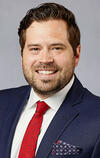In The News: Lee Business School

Las Vegas-based tech startup Workbnb wants to help owners of short-term rentals attract a different kind of tenant — traveling workers.
In a market relying so heavily on the growth of sports, this initiative envisions itself as the center of sports sciences, business and innovation in Las Vegas. The UNLV Sports Innovation Initiative (SII), which calls itself, “The Hub of Innovation in the Global Sports Capital,” took time at a UFC-owned venue Wednesday to hammer home its mission.

The UNLV's Center for Business and Economic research will start their next economics microcredential for Clark County School District teachers on April 15.

In a memo sent to state government employees in January, the state of Nevada banned TikTok from government devices. Nevada joins more than half of all states in banning the Chinese social media app.

Las Vegas resident Michael McCarthy used to visit casinos about five times a month, but now he only visits once a month for one reason: inflation.

Las Vegas resident Michael McCarthy used to visit casinos about five times a month, but now it’s down to once a month for one reason — inflation.

The parent companies of regional banks in Nevada tried to assuage client concerns after trading in their shares was temporarily halted several times on Monday as panic spread among investors after the collapse of two big banks.

Parent companies of regional banks in Nevada sought to quell customer concerns after their stocks were temporarily halted from trading several times Monday, as panic spread among investors following the fall of two large banks.

Total employment in Nevada rose to more than 1.5 million jobs in January, while the unemployment rate stayed the same at 5.5 percent, numbers that suggest a tight job market, according to the Nevada employment office.

Total employment in Nevada rose to more than 1.5 million jobs in January, while the unemployment rate stayed the same at 5.5 percent — figures that suggest a tight labor market, according to Nevada’s employment office.

The former industrial town in Minnesota is coming to terms with its status as a refuge for people moving from across the country because of climate change.

More people and more Californians keep moving to Nevada every year, according to UNLV researchers. The data shows a continued influx of people in 2021 and 2022, despite higher mortgage rates and the start of an economic slump.



